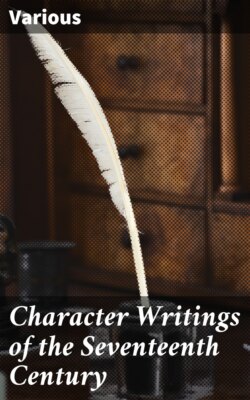Читать книгу Character Writings of the Seventeenth Century - Various - Страница 54
На сайте Литреса книга снята с продажи.
A WORTHY COMMANDER IN THE WARS
ОглавлениеTable of Contents
Is one that accounts learning the nourishment of military virtue, and lays that as his first foundation. He never bloodies his sword but in heat of battle, and had rather save one of his own soldiers than kill ten of his enemies. He accounts it an idle, vainglorious, and suspected bounty to be full of good words; his rewarding, therefore, of the deserver arrives so timely, that his liberality can never be said to be gouty-handed. He holds it next his creed that no coward can be an honest man, and dare die in it. He doth not think, his body yields a more spreading shadow after a victory than before; and when he looks upon his enemy's dead body 'tis a kind of noble heaviness--no insultation. He is so honourably merciful to women in surprisal, that only that makes him an excellent courtier. He knows the hazard of battles, not the pomp of ceremonies, are soldiers' best theatres, and strives to gain reputation, not by the multitude but by the greatness of his actions. He is the first in giving the charge and the last in retiring his foot. Equal toil he endures with the common soldier; from his examples they all take fire, as one torch lights many. He understands in war there is no mean to err twice, the first and last fault being sufficient to ruin an army: faults, therefore, he pardons none; they that are precedents of disorder or mutiny repair it by being examples of his justice. Besiege him never so strictly, so long as the air is not cut from him, his heart faints not. He hath learned as well to make use of a victory as to get it, and pursuing his enemies like a whirlwind, carries all before him; being assured if ever a man will benefit himself upon his foe, then is the time when they have lost force, wisdom, courage, and reputation. The goodness of his cause is the special motive to his valour; never is he known to slight the weakest enemy that comes armed against him in the band of justice. Hasty and overmuch heat he accounts the step-dame to all great actions that will not suffer them to drive; if he cannot overcome his enemy by force, he does it by time. If ever he shake hands with war, he can die more calmly than most courtiers, for his continual dangers have been, as it were, so many meditations of death. He thinks not out of his own calling when he accounts life a continual warfare, and his prayers then best become him when armed cap-à-fie. He utters them like the great Hebrew general, on horseback. He casts a smiling contempt upon calumny; it meets him as if glass should encounter adamant. He thinks war is never to be given o'er, but on one of these three conditions: an assured peace, absolute victory, or an honest death. Lastly, when peace folds him up, his silver head should lean near the golden sceptre and die in his prince's bosom.
